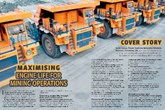Appian to acquire majority shareholding in Rosh Pinah Solar Park
Published by Jess Watts,
Editorial Assistant
Global Mining Review,
Highlights
- Solar plant will reduce Rosh Pinah Zinc’s cost of energy by 8% for the next 15 yr and cover 30% of the mine expansion project’s energy requirements.
- This will diversify Rosh Pinah Zinc’s sources of energy and improve price security through a fixed nominal rate offtake agreement.
- Improves the mine’s sustainability, reducing its carbon footprint by 14 kt of CO2 emissions per year.
As part of the agreement, Appian plans to increase the solar plant’s output from 5.4 MWp to 16.3 MWp, providing 30% of the energy supply required for Rosh Pinah Zinc’s expansion project, RP2.0. The solar project will supply clean energy to the mine through a fixed nominal rate 15-yr offtake agreement, reducing its cost of energy by 8%. RP2.0 will deliver an increase in Rosh Pinah Zinc’s ore production from 0.7 million t to 1.3 million t of ore per annum, and is now more than 60% completed.
The investment in RPSP provides attractive risk-adjusted returns and tangible savings for the mine and Appian. The transaction is part of Appian’s clean energy strategy, supporting the business’ ambitions to decarbonise its portfolio. The investment will reduce Rosh Pinah Zinc’s carbon emissions from electricity consumption by 6%, and lower its overall carbon emissions by 14 kt a year, equivalent to planting over 20 000 trees.
Increasing the capacity of the solar plant to 16.3 MWp will help to optimise the value of the asset. Emesco Energy will continue to operate the solar plant and develop the expansion. The project will benefit from cost synergies by leveraging Appian’s management and expertise from existing solar plant operations in Brazil, where 20 solar plants are being developed to support the company’s portfolio in the Minas Gerais region. Appian is also exploring increasing Rosh Pinah Zinc’s share of energy supplied from the solar project to unlock further cost savings and carbon emissions reductions.
Namibia has favourable conditions for solar energy production, with a high number of annual sunshine hours and one of the largest solar energy yields in the world. Appian’s investment in the project and its clean energy supply will also support Namibia’s energy independence, as the country currently relies on almost 3000 GWh of imports per year, which accounts for approximately 75% of its annual energy usage.
Michael W. Scherb, Founder and CEO of Appian, commented:
“This is an important investment that will support Appian’s decarbonisation ambitions and provide tangible cost benefits to Rosh Pinah Zinc, while offering attractive risk-adjusted returns to our investors. The project is another important step for Appian’s clean energy strategy, following the development of our solar plant operations in Brazil. I look forward to working with our team to deliver on the opportunity this investment offers the business.”
Rinus Strydom, Managing Director of Emesco Energy, commented:
“This investment by Appian is a pivotal step, not only in expanding the RPSP renewable energy plant, but also expanding Namibia’s energy generation sector in general. Emesco looks forward to collaborating with Appian and commends their clear commitment to decarbonise, drive down the cost of energy, and increase energy supply diversity within their portfolio.”
Read the article online at: https://www.globalminingreview.com/environment-sustainability/20022025/appian-to-acquire-majority-shareholding-in-rosh-pinah-solar-park/
You might also like
GMR Year-In-Review: November/December 2025
Catch-up on Cummins’s cover story and more from GMR November/December 2025 – Sean Lynas, Power Systems Industrial Markets Director, Cummins, UK, reviews the importance of long-term partnership and smart optimisation for extending the operational life of engines.

